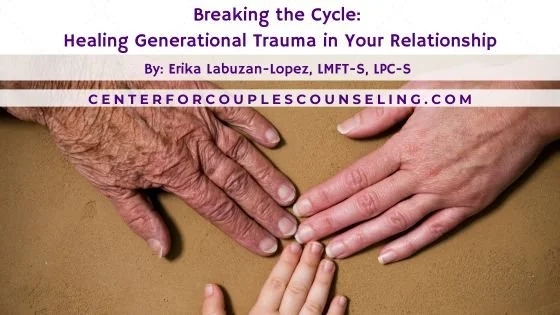Breaking the Cycle: Healing Generational Trauma in Your Relationship
Do you ever find yourself saying or doing something and have the thought “OMG, my mom’s voice just came out of my mouth? What’s that about?” Yeah, me too. There are some qualities passed through generations that are enjoyable or adaptive, like holiday traditions or how your family comes together for game night every Friday. However, I’m sure the thing most of us notice and can stop you cold in your steps is when you engage in a trauma response without even realizing it’s happening.
Trauma, particularly generational trauma, is an insidious presence that can seep into the fabric of our relationships, influencing behaviors, reactions, and interactions in ways we might not even be conscious of. Generational trauma, also known as intergenerational trauma, refers to the transmission of trauma from one generation to the next. This phenomenon means that the pain, fears, and behavioral patterns stemming from a traumatic experience do not end with the person who experienced it but can be passed down to their descendants.
Understanding Generational Trauma
Generational trauma often manifests in subtle ways. It can be seen in how we handle stress, conflict, and intimacy. For instance, a person whose grandparents survived a war might have ingrained responses to scarcity, fear, and uncertainty, even if they have never personally experienced such conditions. These responses are often taught, modeled, and reinforced through family dynamics and cultural narratives.
In relationships, generational trauma can create patterns that perpetuate cycles of misunderstanding, conflict, and emotional distance. Partners may find themselves reacting to each other in ways that seem disproportionate to the situation at hand, driven by deeper, unresolved issues from the past. Recognizing and addressing these patterns is crucial for breaking the cycle and fostering a healthy, supportive relationship.
Identifying the Signs
The first step in healing generational trauma is identifying its presence. Signs may include:
Repeated Conflicts: Recurring arguments that seem to follow a familiar script, often escalating quickly and without clear resolution.
Emotional Reactivity: Overreacting to minor triggers, which may be tied to past trauma rather than the current situation.
Avoidance: One or both partners may avoid discussing certain topics or emotions, fearing conflict or discomfort.
Hypervigilance: A heightened state of alertness, often stemming from past experiences of danger or instability.
Healing Together
Healing generational trauma in a relationship requires a joint effort, patience, and a commitment to understanding and growth. Here are steps to consider:
Open Communication: Creating a safe space for honest and open dialogue is essential. Partners should feel comfortable sharing their fears, experiences, and triggers without judgment.
Empathy and Understanding: Acknowledging each other's pain and the historical context behind it can foster empathy. Understanding that reactions may be rooted in past trauma can help in responding with compassion.
Therapy and Counseling: Professional help can be invaluable. Therapists trained in trauma can guide couples through the process of unpacking and addressing generational issues.
Mindfulness and Self-awareness: Practicing mindfulness can help individuals become more aware of their emotional responses and triggers. Self-awareness is the first step towards making conscious changes.
Breaking Patterns: Actively working to change unhealthy patterns of behavior is crucial. This might involve setting new boundaries, developing healthier communication strategies, or finding new ways to cope with stress.
Building a New Legacy
Healing from generational trauma is not just about stopping the cycle of pain; it’s about creating a new legacy. By addressing and healing these deep-rooted issues, couples can pave the way for healthier, more fulfilling relationships for themselves and future generations. This process involves learning, growth, and sometimes discomfort, but the outcome is a relationship built on mutual understanding, respect, and love.
While generational trauma can cast a long shadow over relationships, it is possible to break the cycle. Through awareness, empathy, and a commitment to healing, couples can transform their relationships and create a brighter, more connected future. By doing so, they not only heal themselves but also provide a healthier emotional foundation for their descendants, thus breaking the cycle of trauma and fostering a legacy of love and resilience.
My name is Erika Labuzan-Lopez, LMFT-S, LPC-S and I’m the owner at the Center for Couples Counseling. I love using a variety of techniques to help couples learn why they move into childish spaces during conflict, how to put down those defenses for good, and what to do when you can’t access the tools you know will work to get out of conflict. I love working with couples and individuals to learn how to live in the world more relationally and engage in meaningful relationships. With over a decade of couples therapy experience, I am passionate about training and supervising therapists to become specialized in highly effective couples therapy. We see couples, individuals, and all residents of Texas online. Call (832) 827-3288 to schedule your FREE phone consultation.
Start Couples Therapy in League City, TX
Are you and your partner struggling with marital issues? Looking to build a strong and secure relationship? At Center For Couples Counseling, you and your partner can learn to reconnect, create a healthy relationship, and gain support from our skilled couples therapists. To get started with couples therapy follow these three simple steps:
Contact us to schedule an appointment
Meet with one of our caring couples therapists
Begin working on your relationship and reconnect with your partner.
Other Services Offered At Center For Couples Counseling
Our team understands your relationship might be facing different challenges. So our Texas practice offers other therapies to help you face these challenges. Other services include individual therapy, infertility counseling, postpartum anxiety and depression counseling, therapy for self-care and burnout, and therapy for perfectionism. For more about us check out our FAQs and blog!




